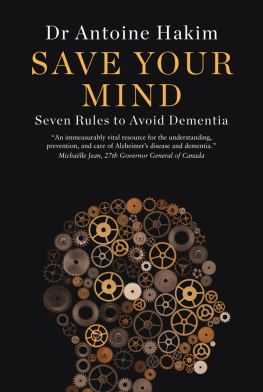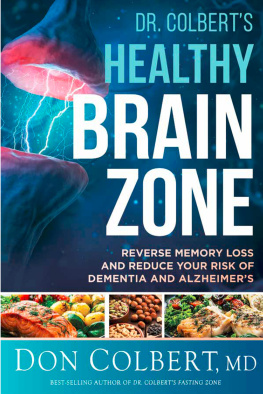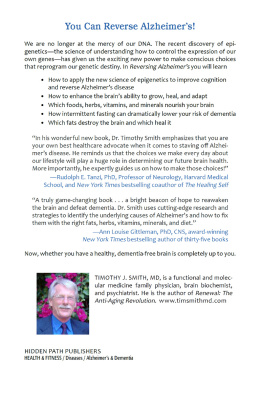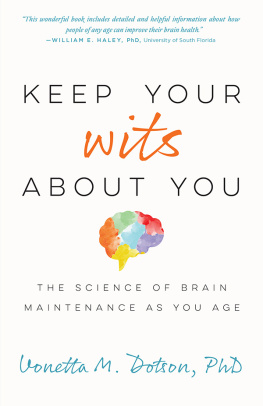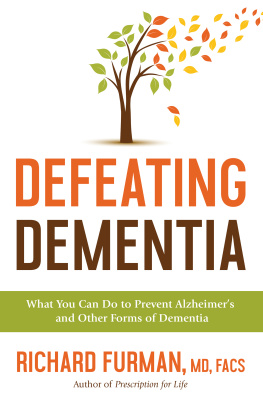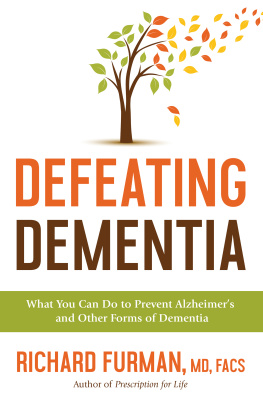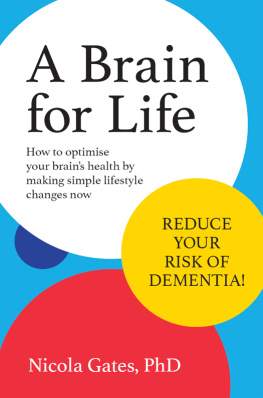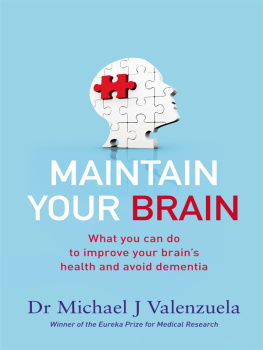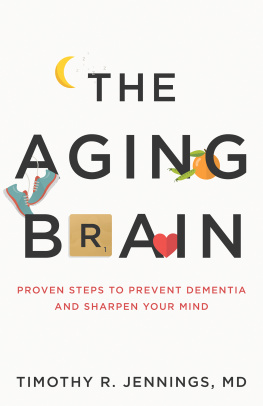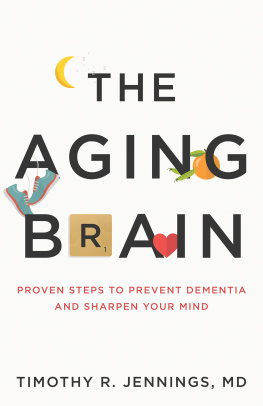Advance Praise for Save Your Mind
With advice that is actionable, in language that is sharp, Dr. Hakim shows, explains, and sensitizes. As he uncovers the human dimensions of the disease and what can be done, he enables us to care better for ourselves, and others. This book is a gift, an invitation to the human spirit, a call to our formidable capacity to engage in combat and change course. Armed with love, determination, empathy, and the very memories that are under attack, everyone can take steps today so the future doesnt take away the present, then the past. This book is for everyone who owns a brain.
Michalle Jean, Secretary General of La Francophonie and
Governor General of Canada (2005 to 2010)
Dr. Hakims book shines a light on the critical importance of brain health: what we put in our heads helps protect us from both stroke and dementia. The book emphasizes the brains constant need for good blood supply, and describes how vascular risk factors such as high blood pressure can be managed through long-term regular physical activity, healthy eating, good sleep habits, avoiding loneliness, and exercising the brain by learning new activities. This book raises awareness around the risk of dementia and provides essential and practical information for anyone who wishes to reduce the risk for this awful condition.
Dr. Patrice Lindsay, Director, Stroke, Heart & Stroke Foundation
Dementia is a huge problem, and this impressive book can help each one of us reduce our risk for it.
Dr. Yves Joanette, Chair, World Dementia Council
When approaching middle or old age, who of us has not been afraid of the possibility of developing dementia? In a well-researched book, Dr. Hakim outlines seven practical measures each of us can take to prevent, or at least postpone, this unpleasant disease.
Franois Mai, MD, FRCPC, FRCP (Ed), Adjunct Professor,
Faculty of Medicine, Queens University, and author of
Diagnosing Genius: The Life and Death of Beethoven
SAVE YOUR
MIND
Seven Rules to Avoid Dementia

Antoine Hakim, O.C., MD, PhD, FRCPC

Copyright Antoine Hakim, 2017
All rights reserved. No part of this publication may be reproduced, stored in a retrieval system or transmitted, in any form or by any means, without prior written consent of the publisher.
Disclaimer: Efforts have been made to ensure information is correct and accurate. The author and the publisher accept no liability for errors. We take no responsibility for loss or damage as a result of a person doing something or not doing something in accordance with the teaching in this book. The book is not providing legal, accounting, or lifestyle advice, and input from a competent professional should be sought.
Library and Archives Canada Cataloguing in Publication data available upon request.
ISBN 978-1-988025-21-6
ISBN EPUB: 978-1-988025-32-2
Printed in Canada
In Canada:
Georgetown Publications
34 Armstrong Avenue, Georgetown, ON L7G 49R
In the U.S.A.:
Midpoint Book Sales & Distribution
27 West 20th Street, Suite 1102, New York, NY 10011
For more information, visit www.barlowbooks.com

| Barlow Book Publishing Inc. 96 Elm Avenue, Toronto, ON Canada M4W 1P2 |
For my grandmother and parents, who despite forced migrations and extreme poverty remained committed to their childrens success and happiness.
For my wife and children, who lovingly understood and accepted my prolonged commitment to writing this book.
List of Figures
List of Tables
Introduction
Why You Need to Read This Book and Follow Its Seven Rules
This book will help you keep your marbles!
We are all getting older, were living longer, and were terrified of losing our minds and having dementia. This book is written because I believe I have advice that will substantially reduce your likelihood of having dementia. The main lesson my 40 years of neurology practice have taught me is that vascular disease affecting the brain, combined with harmful behavioural patterns, contributed to dementia in the majority of cases. This combination usually led to sufficient damage to the brains structure and integrity that normal thinking and memory recall became difficult if not impossible.
This book is not intended only for the older citizen. It is now clear that the script for dementia is written very early, perhaps as early as our teenage years, so this book is written for everyone who cares about keeping the mind healthy. In my neurology practice, I have seen patients in their 40s who complained of brain fog and were clearly staring at the abyss of dementia. Some were able to reverse course and avoid that outcome while others continued their downhill path and over a few years became heavily dependent on their environment.
In the following pages, I will share with you knowledge I have gained from research done in Canada, the United States, and internationally on the topic of strokes and other vascular diseases that affect the brain. I will advise you especially on how to avoid them. I will also share with you knowledge on how to acquire some patterns of behaviour and avoid others in order to preserve your cognitive abilities. Lectures I have given internationally on the topic were always so popular that I decided to include in this book advice on how to maintain your ability to think and remember. You will learn how memory works in our brains and how to distinguish normal forgetfulness from more sinister possibilities.
The important message in this book is this: The risk of dementia is modifiable.
We do not have to acquire dementia as we age. There are lots of good examples of individuals, and even entire societies, where people remain intellectually sharp into very old age. I will give several examples of healthy minds in old age and extract from the accumulated studies advice you need to follow to stay sharp. To accomplish this, I have summarized current knowledge into seven rules to guide your future mental and cognitive health. These seven rules are based on my clinical experience, published research work, and voracious reading of the medical literature. The rules will benefit every person interested in preserving their mind and their ability to think and remember.
So read, enjoy, and get with the program.
Happy reading!
Before the Rules,
A Few Facts
We Are Living Longer, But We Also Want Good Life Quality
Dementia is by and large a disease that accompanies old age, and all of us are hoping, indeed expecting, that we will live longer than our parents did. Statistics confirm this expectation of longevity. They tell us that currently 50 million Americans are older than 65, and that in Canada 16% of the population is in that category. This demographic group is growing faster than any other. Not only that, but the rate of growth of this group is accelerating. Once Americans reach the age of 65, the average remaining life expectancy is still 20.4 years for women and 17.8 years for men.
Its not just that we are living longer; our attitude towards old age is also changing. I saw an obituary recently that said, Jo Smith died unexpectedly at the age of 93. While we are of course delighted that lifes joys may be ours for longer than we anticipated, our fervent desire is not just to live long in years. We also want good life quality. And for most of us that means keeping our marbles and our independence as we age. We are aware deep in our souls that without the health of our brain and our mind, there is no health.
Next page
